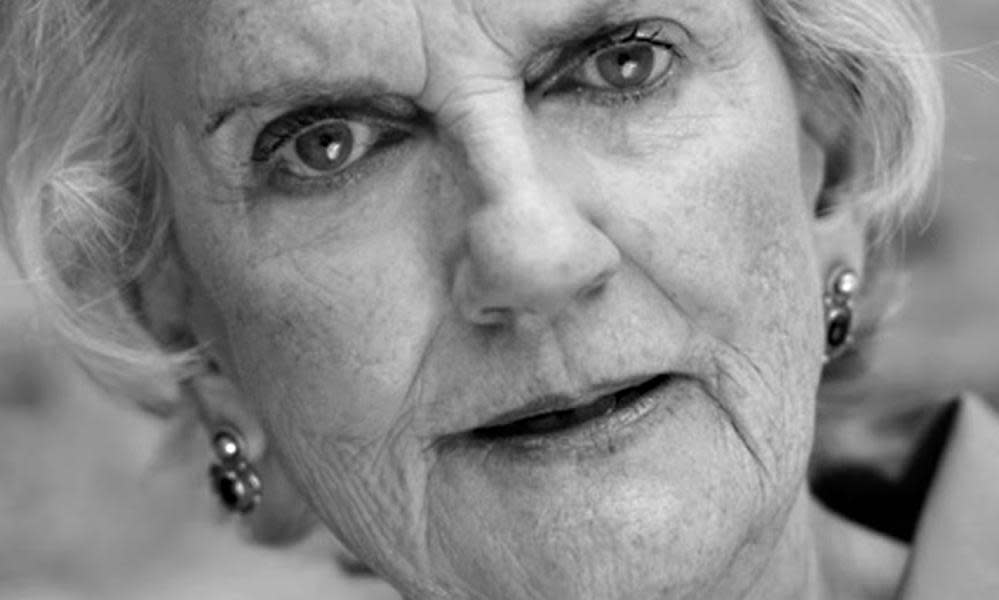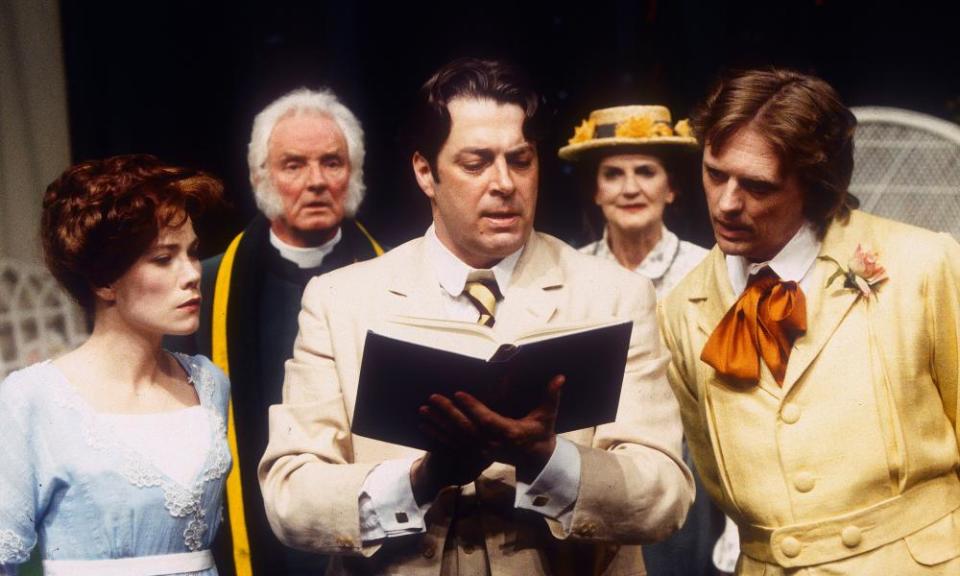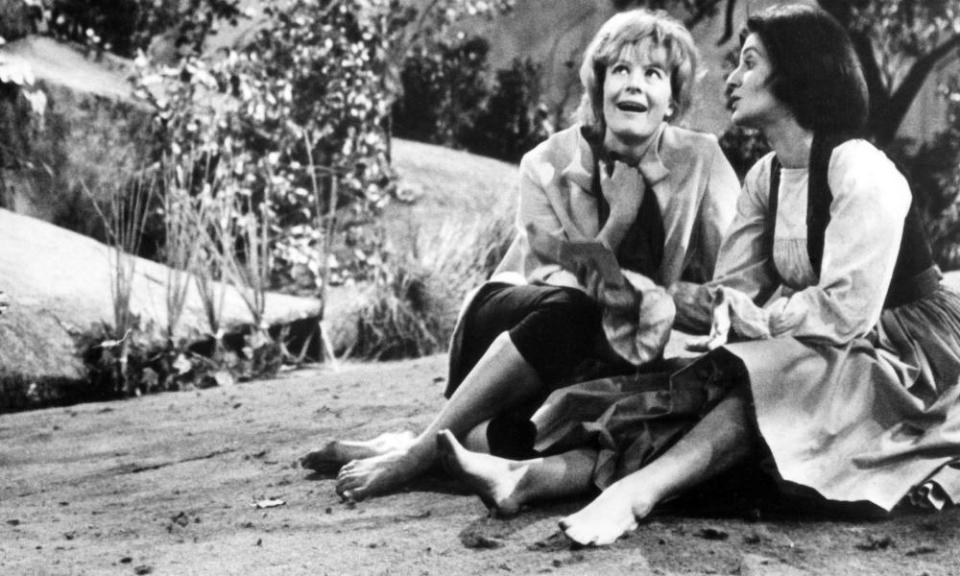Rosalind Knight obituary

In a career stretching over seven decades, the distinctive, cut-glass character actor Rosalind Knight, who has died aged 87, renewed her television profile with younger audiences in two quirkily original comedy sitcoms: Jonathan Harvey’s Gimme Gimme Gimme (1999-2001) and Robert Popper’s Friday Night Dinner (in the second series, 2012).
She dressed down and mussed up her hair for Beryl Merit, a retired prostitute and landlady of the north London flat shared by Kathy Burke’s foul-mouthed Linda La Hughes and James Dreyfus’s unsuccessful acidulous actor; and reversed that process for Cynthia Goodman, aka “Horrible Grandma”, who aggressively stiffens the tone of the Friday night ritual hosted by her son (Paul Ritter) and his wife (Tamsin Greig).
Much earlier television work had included an extremely well-coiffed and more entitled dinner guest in David Mercer’s On the Eve of Publication (1968), one of the most bilious of the BBC Wednesday Play series, in which Leo McKern went magnificently large as a cynical alcoholic novelist; an adoption society officer, Mrs Ramsden, in a 1981 episode of Coronation Street; and another landlady, this time in Margate, in a Christmas special of Only Fools and Horses (1989).
Most recently she was Princess Alice of Battenberg, Prince Philip’s mother, in the first series of The Crown (2016).
Born in London, Rosalind Knight herself came of dynastic stock, as the only daughter of a distinguished theatrical marriage between Esmond Knight, a classical actor who lost an eye in action in the second world war and replaced it with a variety of coloured glass ones, and Frances Clare, a beauty of musical theatre who appeared in Ivor Novello’s The Dancing Years. When her parents divorced in 1946, Rosalind immediately acquired a stepmother, Nora Swinburne, also an actor. Frances and Nora had long been best friends. Esmond was happy with both, and they with him.
While boarding at Cheltenham Ladies’ college, Rosalind was taken by her father in 1949 to see the Young Vic company perform The Snow Queen and As You Like It in the bombed-out ruins of the Old Vic. She knew instantly what she wanted to do. She auditioned, and was accepted by, the Old Vic Theatre school run by Michel Saint-Denis and Glen Byam Shaw shortly afterwards.

It is a remarkable coincidence that she, and two contemporaries at the school, later married three future founding directors of the Royal Exchange in Manchester: Rosalind was married to Michael Elliott, Avril Elgar to James Maxwell and Dilys Hamlett to Caspar Wrede. This social and working nexus was formed in the late 1950s across several companies, culminating in the Royal Exchange in 1976.
Rosalind met Michael in television, where she was Fanny Squeers in a BBC 1957 10-episode series of Nicholas Nickleby (her father was Wackford Squeers, ideally cast with the glass eye). She had spent five years in weekly rep, two of them in Ipswich, where a fellow actor and assistant stage manager (an acting ASM) was Joe Orton.
Michael was moving back into theatre and encouraged his new wife – they married in 1959 – to do so, too. Rosalind had by then made a mark in three comic British movies: as a schoolgirl in Blue Murder at St Trinian’s (1957), with Terry-Thomas and Joyce Grenfell; and in the second and third of the Carry On film series, both in 1959. She was a myopic student nurse in Carry On Nurse and a prim school inspector with amorous proclivities in Carry on Teacher (in which she was confronted by Leslie Phillips brandishing a large pair of knickers).
A change of gear, then, came with Rex Harrison in Chekhov’s Platonov and John Arden’s This Happy Haven, with Edward Fox and James Bolam, and lots of mask work, at the Royal Court in 1960. In the second RSC season at Stratford-upon Avon in 1961, she was directed by Elliott in As You Like It as, said Michael Billington, a Celia of “sharp-witted intelligence, the perfect foil to Vanessa Redgrave’s heady romanticism” as Rosalind. In a Royal Court 1964 revival of Ben Travers’ A Cuckoo in the Nest, she was Barbara Wykeham, with a cast which included Arthur Lowe, Beatrix Lehmann, Alan Bennett, John Osborne and Nicol Williamson.

When she and Michael moved to Manchester with their two daughters, the 59 Theatre Company he had formed at the Lyric, Hammersmith, morphed into the 69 Company in Manchester – Knight was the Alcharisi to Redgrave’s Gwendolen Harleth in Elliott’s Daniel Deronda adaptation – and then finally the Exchange. There she was a scene-stealing Mrs Erikson, in slippers, housecoat and droopy fag, in Coward’s Blithe Spirit in 1977 and, in the same year, a grandly lubricious Mrs Prentice in Orton’s What the Butler Saw (the leg-spreading character of whom it is said that she’d go to her grave in a Y-shaped coffin).
The best directors always wanted Knight in their casts, and the best of the newcomers were no exception. At the Sheffield Crucible in the 80s, she formed a fruitful relationship with Steven Pimlott as a spinsterish, hatchet-faced Charlotta in The Cherry Orchard – carrying the most hideous of little black dogs – and as a superbly ferocious and authoritative Paulina in The Winter’s Tale (Jim Broadbent as Leontes).
Under Jonathan Miller’s brief but brilliant tenure at the Old Vic (1988-90) she appeared in three extraordinary re-imaginings of European classics by the director Richard Jones: Ostrovsky’s savagely cartoonish Too Clever By Half in Rodney Ackland’s translation; John Mortimer’s version of Feydeau’s A Flea in Her Ear on the stage where it was first seen 20 years previously, now transformed into an expressionist nightmare, testing the farcical genre to its limit; and Corneille’s The Illusion, in which she appeared as an oddly aNdrogynous magician with slicked back hair and purple suit.
Another great rediscovery, at the Almeida in 1992, was Griboyedev’s Chatsky (better known as Woe from Wit) in a new version by Anthony Burgess, directed by Jonathan Kent, in which she more than held her own in a cast including Minnie Driver, Colin Firth (as “the Russian Hamlet”) and John Fortune. In all these roles, as in most aspects of her life, she never followed convention. Her hobbies definitely included swimming against the tide.
She was reunited with Pimlott in a great 2007 National Theatre revival of The Rose Tattoo by Tennessee Williams, playing the Sicilian village witch opposite Zoë Wanamaker’s tremendous Serafina. Pimlott died before the opening, but Nicholas Hytner, the NT’s artistic director, saw his friend’s work through to a resounding completion.
After her appearance as Mrs Fitzpatrick in Tony Richardson’s Tom Jones (1963), her film work was sporadic, though she made incisive contributions to Stephen Frears’s Prick Up Your Ears (1987, with Gary Oldman as Joe Orton); two directed by Mark Peploe, Afraid of the Dark (1991) and About a Boy (2002, with Hugh Grant and Toni Collette); and in Hytner’s The Lady in the Van (2015), as an old nun in Alan Bennett’s meta-theatrical memoir of an unlooked-for dependent.
For many years, Knight was an active and constructive participant in the Actors’ Centre, established by Alan Bates in 1978 in memory of his son Tristan, and in the Theatre Guild, formerly the Theatrical Ladies’ Guild, which offers practical help and financial support to indigent backstage and front-of-house theatre workers.
Michael died in 1984. Knight is survived by their daughters, Susannah, an experience curator at the National Trust, and Marianne, a stage director of War Horse and The Curious Incident of the Dog in the Night-Time; and by a granddaughter, Eve.
• Rosalind Marie Knight, actor, born 3 December 1933; died 19 December 2020


